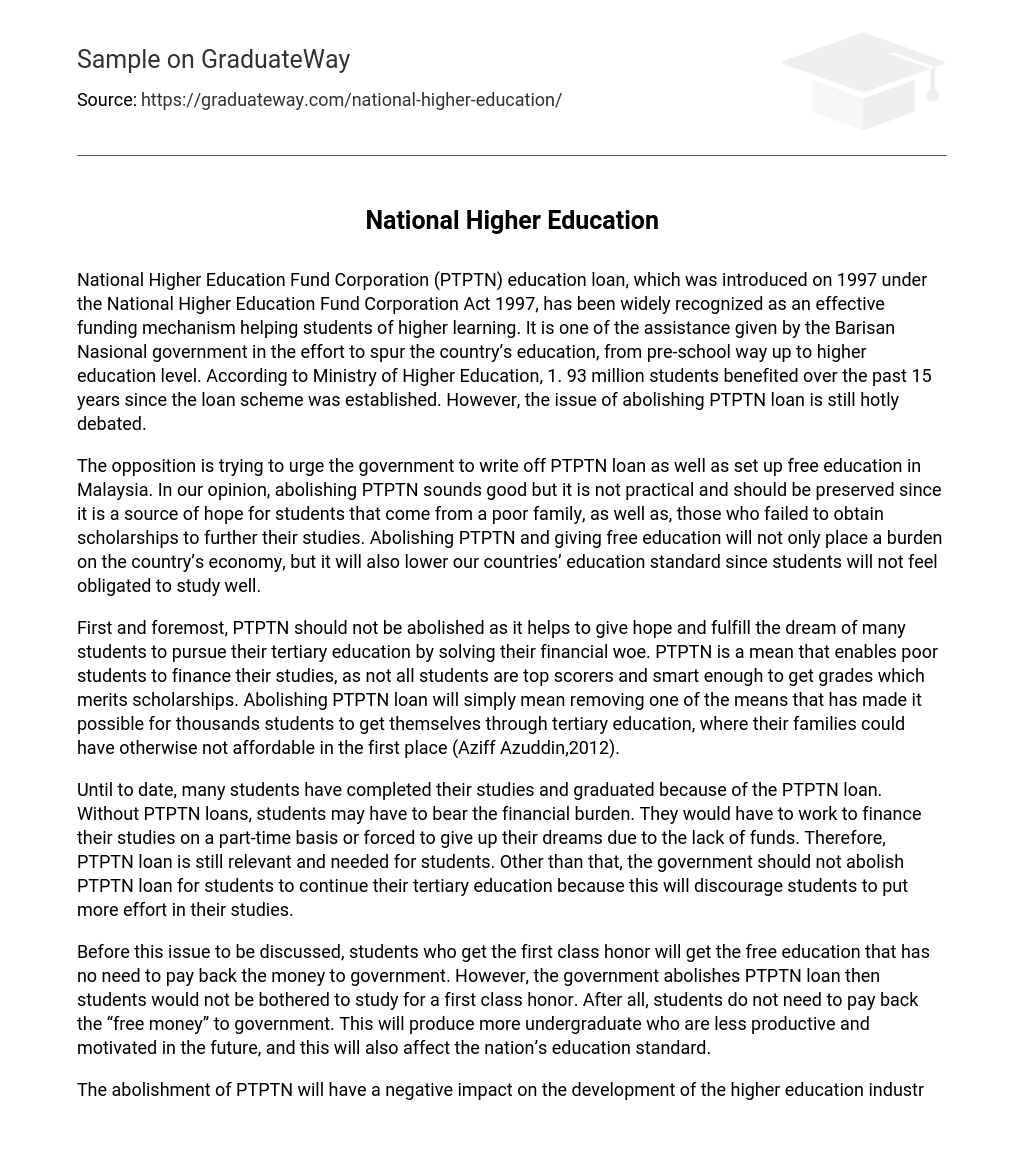National Higher Education Fund Corporation (PTPTN) education loan, which was introduced on 1997 under the National Higher Education Fund Corporation Act 1997, has been widely recognized as an effective funding mechanism helping students of higher learning. It is one of the assistance given by the Barisan Nasional government in the effort to spur the country’s education, from pre-school way up to higher education level. According to Ministry of Higher Education, 1. 93 million students benefited over the past 15 years since the loan scheme was established. However, the issue of abolishing PTPTN loan is still hotly debated.
The opposition is trying to urge the government to write off PTPTN loan as well as set up free education in Malaysia. In our opinion, abolishing PTPTN sounds good but it is not practical and should be preserved since it is a source of hope for students that come from a poor family, as well as, those who failed to obtain scholarships to further their studies. Abolishing PTPTN and giving free education will not only place a burden on the country’s economy, but it will also lower our countries’ education standard since students will not feel obligated to study well.
First and foremost, PTPTN should not be abolished as it helps to give hope and fulfill the dream of many students to pursue their tertiary education by solving their financial woe. PTPTN is a mean that enables poor students to finance their studies, as not all students are top scorers and smart enough to get grades which merits scholarships. Abolishing PTPTN loan will simply mean removing one of the means that has made it possible for thousands students to get themselves through tertiary education, where their families could have otherwise not affordable in the first place (Aziff Azuddin,2012).
Until to date, many students have completed their studies and graduated because of the PTPTN loan. Without PTPTN loans, students may have to bear the financial burden. They would have to work to finance their studies on a part-time basis or forced to give up their dreams due to the lack of funds. Therefore, PTPTN loan is still relevant and needed for students. Other than that, the government should not abolish PTPTN loan for students to continue their tertiary education because this will discourage students to put more effort in their studies.
Before this issue to be discussed, students who get the first class honor will get the free education that has no need to pay back the money to government. However, the government abolishes PTPTN loan then students would not be bothered to study for a first class honor. After all, students do not need to pay back the “free money” to government. This will produce more undergraduate who are less productive and motivated in the future, and this will also affect the nation’s education standard.
The abolishment of PTPTN will have a negative impact on the development of the higher education industry (Datuk Ahmad Maslan, 2012). Therefore, the government should think about think about the impact of abolishing the PTPTN loan. The final reason we should not abolish PTPTN is it would burden our country to further doldrum. According to RAM Ratings chief economist Yeah Kim Leng(2012), abolish the federal student loan scheme would leave a huge hole in the economy, since the outstanding loan costs for PTPTN is RM43 billion.
MahanimZainal Abidin(2012) say that as a country with a young population, the number of students seeking tertiary education will continue to increase. Therefore the costs for tertiary education will rise and we are faced with the problem of how to allocate the PTPTN costs. In addition, to provide free tertiary education, our country must be a high income and advanced nation. But the fact is Malaysia is still a developing nation and, as such, higher education in particular needs a lot of financial support. In conclusion, education is necessary for those who want to continue their tertiary education.
PTPTN plays an important role in helping students in the financial area. If the government abolishes PTPTN loan, students cannot continue their studies as not enough money to pay the fees, it will also lower our country’s education standard since students will not feel obligated to study well, and increase the country’s burden. Therefore, the government should think carefully and listen to the people concern throughout this issue because this will bring impact either good or bad to our nation and generation.





